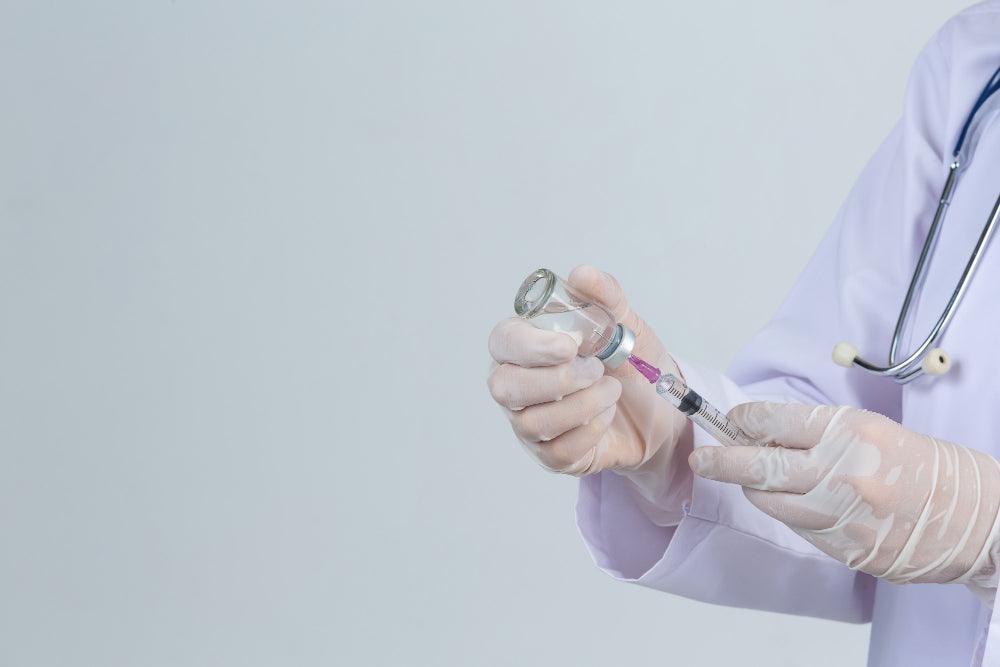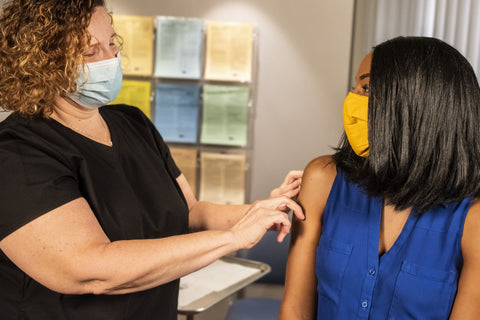Does The Covid Vaccine Affect The Menstrual Cycle?


The average duration of a woman's monthly menstrual cycle has been shown to rise by less than one day after receiving any of nine COVID-19 vaccinations, according to a global survey of statistics from over 20,000 women. This rise was not linked to a shift in bleeding frequency; it was reversed in the subsequent menstrual cycle for most research subjects.
Additionally, various abnormalities in the menstrual cycle, such as intermenstrual spotting of menstrual blood, lighter and heavier menstrual flow, missing phases, and shorter and longer periods throughout the menstrual cycle, have been recorded following COVID-19 immunisation. However, clinical vaccination studies do not capture menstrual cycle results, creating a substantial vacuum for people's understanding of these concerns and driving many researchers to dig further into what the population was saying. This article investigated the connection between COVID vaccine and the menstrual cycle.
Women's bodies become ready for conception throughout their menstrual cycles. The uterus of the female reproductive tract will lose its lining if you're not pregnant because of hormones. Hence, your menstruation will start from here on out. If you've just started your period, it's time to begin counting down till next time. The time between the beginning of one period and the beginning of the next is considered one menstrual cycle. Although the average duration of a menstrual cycle is 28–29 days, this range is not set in stone. Teenage girls or the average age may experience periods lasting 45 days, whereas adult women may experience cycles between 21 and 38 days.
In addition, menarche is the time when you start having periods. A first period may begin as young as nine and as late as sixteen in Western nations, with 12–13 being the most common. Menopause is also the medical term for when you stop having periods. Most women enter menopause between the ages of 51 and 52. Menopause may occur at any time after age 45; in some cases, it can occur as late as age 60.
The menstrual period typically consists of four stages.
The term period is widely used to refer to menstruation. The lining of the uterus is lost and then oozes out of the vagina during menstruation, whereas the uterine lining cells, mucus, and blood are all part of your period. Menstruation typically lasts anywhere from three to seven days.
You may utilise sanitary products, menstrual caps, period underwater, and tampons to contain your period. Each three to four hours is the recommended changing frequency for tampons and pads, whereas each eight to 12 hours is the recommended varying frequency for menstrual cups.
When your menstrual cycle begins, your body enters the follicular phase or the follicle stimulating hormone, lasting at least 13 to 14 days and culminating in ovulation. The follicles on an ovary's surfaces are stimulated into growth by a hormone released from the pituitary gland in the brain. Most of the time, only one of your follicles will develop into a fully formed egg. As early as day 10 of your cycle, you may experience this. At this point, your uterine lining has already expanded in anticipation of pregnancy.
Ovulation occurs whenever a fully developed egg travels through the fallopian tube from the ovaries to the uterus. Typically, this happens once a month, approximately two weeks before your period is due. There is a wide range of time, from 16 to 32 hours, in which ovulation may occur.
Moreover, pregnancy is likely to add up to and includes the day of ovulation, which may be as early as the fifth day before ovulation. However, conception is most likely to occur three days before ovulation. The egg has a maximum survival time of 24 hours after being discharged. Pregnancy is possible if the sperm penetrates the egg at this period.
Ovarian or corpus luteum cells produce progesterone and a trace quantity of oestrogen following ovulation. The uterine lining will get thicker, ready to receive a developing embryo. When a fertilised egg implants in the uterine lining, the corpus luteum keeps pumping out progesterone to keep the interior of the uterus nice and thick. After ovulation has failed to result in pregnancy, the corpus luteum expires, progesterone levels fall, the uterine lining is shed, and a new menstrual cycle starts.

The vaginal lining gets slick and smooth for a few days after ovulation. This mucus aids in the transport of sperm from the uterine to the oviduct, where they may fertilise eggs. Abdominal discomfort is common among women experiencing ovulation. It is possible to see ovulation in women on rare occasions. Ovulation is regulated by substances called luteinizing hormone (LH). In the 30 minutes leading up to ovulation, LH levels begin to rise. Others are being tested for LH levels, and several have already been confirmed. Around 24 hours before ovulation, LH levels are at their highest. Menstrual issues include:
Most accuracy may be expected when employing a mix of these approaches. Minor abdominal discomfort and breast tenderness are also common during ovulation, but they are not good indicators of whether a woman is ovulating.

The research found that the COVID-19 vaccination may cause slight, transitory alterations in the duration of your menstrual cycle. However, according to scientists, vaccination is still recommended as a means to protect against the new coronavirus. Scientists headed by an anthropologist at the University of Illinois Urbana-Champaign examined data from over 35,000 women before and after menopause regarding their menstrual cycles in the weeks following the administration of the COVID-19 vaccine.
There was no evidence that any of the subjects had been previously exposed to COVID-19. Research teams didn't include women 45–55 because of potential confounding with post-menopause and premenopause symptoms, such as irregular menstrual.
The study researchers said that:
For the first time, a study of persons who utilise testosterone or other medications that control menstruation was conducted in April 2022 by scientists at Washington University in St. Louis to evaluate breakthrough bleeding induced by the COVID-19 vaccination. Participants in the study included those who identified as gender-fluid, nonbinary, and transgender.
One-third of the 552 participants who reported employing testosterone or other gender-affirming hormone levels and not normally menstruating observed menstrual bleeding upon receiving a COVID-19 vaccine. In addition, 9% of breast aches reported chest pains, and 46% admitted finding other symptoms typically associated with the period, including bloating and cramping.
While it is crucial to highlight that menstruation is not always consistently controlled with these medications, the research did not indicate the proportion of responders who had breakthrough bleeding before immunisation.

Whenever a vaccination is readily accessible, women who are trying to conceive have the option of receiving it. Vaccination has not been shown to affect fertility negatively. Vaccinated women are not advised to delay or forgo having children. Having the vaccination does not necessitate a pregnancy test. Scientists suggest that everyone thinking about becoming pregnant in the near future needs to be vaccinated. Vaccination should be considered since the dangers of COVID-19 outweigh those of the vaccine.
The present study demonstrated that vaccination against COVID-19 had no harmful impact on fertility in women who were menstruating at the time of the survey. Despite a small rise in menstrual cycle duration after vaccination, this change was well within the range of variability in the research sample. Vaccine dosages administered during the follicular phase of the menstrual cycle are likely to blame for the lengthening of the period after immunisation. However, the effects were less noticeable with every next cycle, and ultimately, none lasted. In conclusion, women must be encouraged to get the COVID-19 vaccine because it safeguards people from virus transmission.
If you would like to order a Covid-19 Antibody Test from our store, shop here.










Plus get the inside scoop on our latest content and updates in our monthly newsletter.